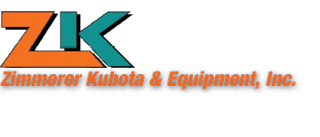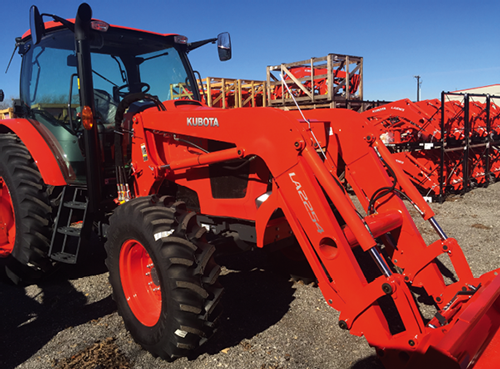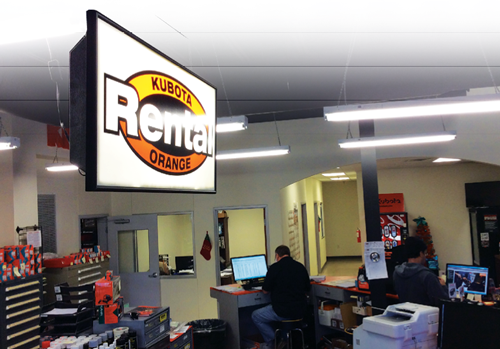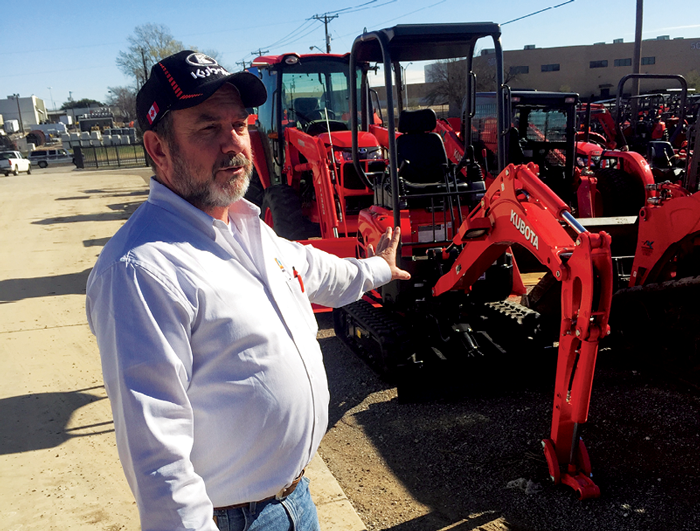
When open spaces in north Texas start “greening up” in March, employees at Zimmerer Kubota & Equipment know it’s time to get ready — and here are some strategies they use to meet seasonal challenges.
Co-owner Sam Zimmerer typically meets with his largest vendors each month to keep on top of wholegoods inventories. However, for March, April and May, he typically needs more than the monthly average for stock as lawn and garden and turf customers come calling. And this includes local municipalities that are gearing up for their busy season, as well.
Zimmerer typically examines both a 3-year sales history supplied by Kubota for every model of equipment and he also looks up sales histories at his own stores to see how many wholegoods were sold at certain times of the year. Then staff discussions ensue about the data and what it means.
“This model that we sold a lot of, is that going to continue?” he asks, describing the typical discussion. “Is there some other factor? Why did we sell that many? Why did it spike up? Was it just a phenomenon? Did Kubota have better programming?
“We look at all those models, every line, model by model, and try to make the best educated guess on what level we’ve got to have,” Zimmerer says.
Staying Sharp
In the spring, rural lifestyle customers are usually the first to visit the stores as they’re ready to mow grass, remove weeds, clear fencerows and trim trees on their properties.
Zimmerer Kubota
& Equipment
Founded: 1979 with a 26,000 square-foot main location in Fort Worth and added locations in Cleburne (1986), Denton (1989), Decatur (1999) and Gainesville (2011), Texas.
Ownership: Cousins Sam and Larry Zimmerer, 25% each; Larry’s brother Leonard, 50%.
Location: Main store near the I-35/820 interchange in Fort Worth. The Denton, Gainesville and Decatur locations are north of the city. The Cleburne store is south of the city.
Lines: AaLadin, Bradco, Bush Hog, Echo, Honda, Houle, Kubota, Land Pride, Rhino, Scag, Stihl, Shindaiwa, Terrain King and Mill Creek
Challenge & Solution: Zimmerer Kubota & Equipment uses regional purchasing cooperatives and leverages its brand reputation to increase sales to municipalities without major investments.

Even though he has a veteran staff, Zimmerer pushes them each year to be prepared. In March, the dealerships typically set up and assemble equipment to stay ahead of demand. Zimmerer prefers diversity with how the dealership displays equipment.
“I don’t want 50 of the same thing put together, although a lot of dealers do,” he says. “That looks kind of impressive, but I want to keep them in the crate, in the shade, as long as I can to keep them looking as new as possible.
“We just try to be ready, that’s the main thing. The phone’s going to ring. You try to make sure that you’re staffed at the level you think you need. If I need three salespeople here, do I have three? Does the parts department have its full complement of workers or does it have the part-time person it needs?”
Zimmerer Kubota tends to be selective in hiring seasonal help, due to the busy nature of its market and the learning curve involved in training them to be an asset. “You can’t just hire them off the street because they don’t know enough and then they’re just in the way,” he says. “I’d rather have nobody help than have somebody who has no clue what they’re doing.”
Getting staff up to speed on Kubota’s new equipment is another priority in the spring. Earlier this year, Kubota Tractor Corp. offered training on the Z700 series commercial zero-turn mower line. Zimmerer sent two people from each location to the school in Dallas to get a refresher on features and benefits of the machines and get details on Kubota’s new financing plans.
“We have to make sure that we understand what the programs are and know the products we’re selling against the competition,” he says.
‘Buy Board’ Builds Sales
For many dealerships, getting a foot in the door to sell equipment and service to municipalities can be a daunting task, given the bidding processes that usually require a government unit to choose the lowest bid. However, Zimmerer Kubota is solving that problem as the revenue from selling tractors, zero-turn mowers, attachments and other equipment to municipalities and school districts make a significant contribution to the dealership’s bottom line.
Zimmerer participates in a number of local and regional “buy boards” involved in cooperative purchasing, a process facilitated by specific purchasing language found in most state laws. Unearthing this windfall took some time and started simply enough many years ago when Zimmerer took a phone call from his brother Tom, who was a superintendent for a local school district.
“Have you ever heard of the ‘buy board?” his brother asked. Zimmerer remembers being a little perplexed, but he explored it further. Today, Zimmerer Kubota is a member of several of these boards, where equipment can be ordered by municipalities and sold through a pre-approved list of vendors, rather than relying on a competitive bidding process that may require governments to take the lowest qualified bid.
Perhaps the biggest cooperative Zimmerer Kubota belongs to is the Houston-Galveston Area Council (H-GAC), a 13-county organization where local governments work together to tackle problems, such as air emissions, commuting or solid waste services. H-GAC offers a government-to-government cooperative purchasing program, H-GACBuy, helping local governments and nonprofit corporations reduce costs through a nationwide procurement service. Government entities can join H-GACBuy by signing an interlocal contract stating the entity is eligible to contract with H-GAC and possesses adequate legal authority to enter into the contract.
For example, a school board that wants to purchase a zero-turn mower to maintain school grounds could work with suppliers approved by H-GAC to purchase the equipment without going through a bid process and, possibly, end up with equipment that doesn’t meet their expectations for quality or performance, Zimmerer says.
Suppliers can join H-GACBuy by submitting a proposal to H-GAC to consider and once approved, customers can order equipment from H-GAC and have their local dealership — or any supplier they choose — handle the preparations and delivery.
Zimmerer Kubota got into the H-GAC purchasing program several years ago, after learning of another Kubota dealership near Houston that was a member, Zimmerer says. Kubota eventually joined the program as a supplier to compete with other majors like John Deere that were already involved.
He says working with the Houston dealership was beneficial because together, the two could handle equipment purchase orders in their own local market area and enhance customer service, rather than trying to service equipment that might have been purchased 400 miles away.
“I don’t want to be a shoebox that we sell out of and we have no parts, no service, no personality, no nothing,” Zimmerer says. “And Kubota isn’t just a commodity. It’s more than that. So, now we can call on all these cities, counties and government agencies and all we have to do is be their best choice because Kubota’s approved with H-GAC.”

Zimmerer Kubota impresses customers with a diverse display of equipment, as opposed to a large lineup of the same kind of equipment. So, some equipment on the lot remains in crates, with the added benefit of staying protected from the weather.
When a customer wants to buy Kubota equipment, H-GAC buys it with a certain percentage off the list price. Kubota gives the chosen dealership funding for make-ready and delivery of the equipment, then the dealership delivers it, billing H-GAC for those costs.
“If I don’t have it in stock, I don’t even get an invoice. All I get is a credit for that amount of the percentage that I get,” Zimmerer says. “If I have it in stock, Kubota actually gives me a credit for that invoice, 100%, and then gives me another credit for the profit on that deal.
“So, it actually doesn’t even hit my books as a sale. All I do is receive the revenue and we put it on a separate line item as a credit. Then, I get a bill from H-GAC for a percentage of the sale amount and I write a check and send it to H-GAC. The only way that H-GAC receives money is from a vendor that has sold a product to one of their members.
More About ‘Buy Boards’
Most states have either “interlocal cooperation” or “joint powers” authority to allow local governments to join and participate in programs like the Houston-Galveston Area Council’s H-GACBuy program. Dealers can earn more business from municipalities by participating and becoming a preferred vendor.
To learn more, view the digital edition of Rural Lifestyle Dealer.
“It’s been a great deal for us because, in almost every case, we win. We’re the guys they want to do business with because we’re professional, we have the nice trucks, we have a good parts department and we know what we’re doing,” Zimmerer says.
In addition to H-GAC, Zimmerer Kubota works with other purchasing boards for Tarrant and Harris counties near Fort Worth and Dallas.
Going Full Time
Zimmerer Kubota also made the investment several years ago to assign a salesperson full time to soliciting and facilitating municipal business. Steve Lee, an assistant store manager in Fort Worth who’s been working at the dealership since 1988, expressed a desire to get out of the office and start visiting government prospects.
At the time, the local economy was struggling and drought conditions were creating additional challenges. Lee noted that governments always have a budget and always pay their bills, and the dealership should be more aggressive seeking their business. Lee began calling on cities and counties and the efforts paid off even further as purchasing became easier through the buy boards.

Rental is an important source of revenue for Zimmerer Kubota’s 5 locations, including the Fort Worth store (above). Dealer principal Sam Zimmerer will typically add new or additional equipment at his stores if the local store manager can show sales data that supports their request.
“It was profitable for us at that point,” Zimmerer explains. “Before, we’d go all over the county calling on people, but if they have to bid and they’re going to take the low bid no matter what, it’s not worth it. Well now, you call on them and they want to buy from you, they issue a purchase order and it’s over.”
Cooperating with Big Boxes
Competition for equipment sales from big box stores can be another challenge, and there’s no shortage of them in the Dallas/Fort Worth metroplex and its 6.5 million people. However, Zimmerer Kubota is getting additional business through a strategic partnership Kubota formed in 2011 with Compact Power Equipment Centers, allowing for select Kubota construction equipment to be rented at Home Depot Tool Rental centers.
This opened the door for Zimmerer Kubota to supply or service Kubota equipment being rented by Home Depot, and adds to the dealership’s brand awareness and reach in Texas.
The revenue from the H-GAC and Home Depot programs go into a separate “national account sales” line item at the dealership.
“We’ve had people from far away that want to pick up their machines here at our dealerships, but again, why?” Zimmerer says. “Because Steve Lee was the man that was in charge and they got their product, it was right, and they liked the way they were treated and they came here.”
Building Rental Revenue
Along with commercial turf, rural lifestyle and construction customers, rental is another important source of revenue for Zimmerer Kubota. All 5 locations have rental departments, each overseen by a local store manager, while Zimmerer oversees them collectively as the general manager.
The dealership uses the Windows-based RIMSS computer system to quickly view rental sales, revenue and other parameters at all locations or just one location at any time. Zimmerer also runs profit-loss statements every month to examine the cost of goods sold, advertising costs or other financial figures. These statements are shared with and discussed with the store managers. Zimmerer doesn’t necessarily have a certain metric to decide if the rental business is performing well or not, other than the bottom line.
View Video Interviews with Zimmerer Kubota & Equipment
See dealer principal Sam Zimmerer discuss how the 5-store dealership became involved with municipal “buy boards;” is making smart decisions on what to add to its rental inventory; and what it takes to be a Certified Kubota Dealer.
“I do look at percentages sometimes to see how many dollars worth of equipment I have at a store and what the revenue has been. Then I’ll get a percentage of that and compare it to the other stores to see who’s doing the best job of revenue percentage to equipment cost,” Zimmerer says. “The only cost to them for having equipment on their lot is their interest expense on the unit as well as the depreciation expense. Otherwise, I don’t bill them anything to have that unit.”
The main goal each year for rental is to make sure each store is stocked properly and operated consistently. Local rental managers typically communicate with Zimmerer on inventory levels or unprofitable tools in the lineup. And Zimmerer also visits outlying stores every 1-2 weeks to discuss month-to-month operational issues.
There are cases where units aren’t renting well and need to be moved out. Once the shop has gone through them, documented and fixed any problems, a decision must be made about selling the unit outright — if it’s in good condition — or sending it to an auction.
Most of Zimmerer’s rental equipment and attachments are Kubota, Land Pride or Bradco brands, but some tough decisions must still be made, occasionally, on which type of equipment to put on the rental lot, Zimmerer says.
If a rental manager wants to add a piece of equipment to their inventory, or add another unit of something already stocked, he will typically ask the local manager to provide a printout of revenues from unit sales to decide if renting the machine will be profitable. If the numbers are there, Zimmerer says he will usually approve it.
“The rental managers are paid a base salary and a percentage of profit. So do they want to make money? Yes. How are they going to make money? Rent more stuff. So do they want to grow? Absolutely,” Zimmerer says. “They may want more equipment, but it has to come through me. Plead your case.”
Although Zimmerer admits to being fairly conservative with rental inventory decisions, he notes that a Bradco brush cutter that attaches to track loaders was rented initially at one store and is now available at 4 stores. A few years ago, a rental manager in Denton asked about adding a forestry mulcher that could be rented — a $100,000 machine. Zimmerer Kubota now has 6 of them.
“Sometimes, it’s a gut feeling,” he says. “We keep up with revenue and expense on every single piece that’s rented. For instance, on attachments, the power unit is one thing to rent, and the implement is another unit that we track. This attachment may have kept this unit busy, but if that attachment doesn’t pull its weight in terms of revenue, then I’ll know.”
“Your paperwork has to be right, your machine has to be right, you have got to do what you say you’re going to do. That all works together...”
Kubota does extend some special financing incentives to dealerships to carry construction equipment for rental — recently it was 0% for 48 months with the only stipulation being to carry it for at least 6 months. Otherwise, Zimmerer says Kubota doesn’t get too involved in how the rental business is run.
Some of Zimmerer Kubota’s dealerships also participate in a rent-to-purchase program through Kubota, allowing dealerships to keep a machine for up to 11 months, paying Kubota 2.5% of the invoice each month, before deciding whether to sell the equipment. “As long as I do that, they don’t care what I do with it. They don’t floor-check it. I can take that revenue and lower the price and do anything I want to do with it,” he says.
Making Tough Decisions
An unfortunate situation happened recently with a rental program at one of Zimmerer’s stores, which led to some changes. Prior to Zimmerer being made the general manager over rental at all 5 stores, he had to terminate one of his rental managers who, according to Zimmerer, “overpromised and under-delivered” with customers.
He found there was no maintenance book at the facility, important paperwork, such as billing, wasn’t always handled properly, and equipment wasn’t being cleaned up or maintained properly before being rented to the next customer. “Your paperwork has to be right, your machine has to be right, you have got to do what you say you’re going to do,” Zimmerer says. “That all works together.”







Post a comment
Report Abusive Comment